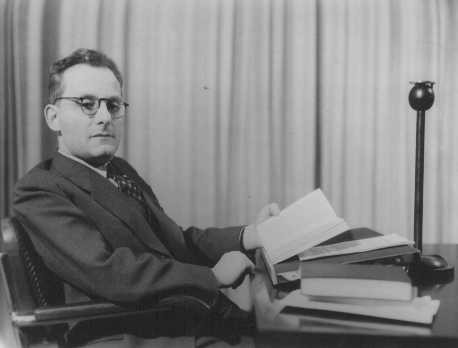
Max Brod
In 1933, Nazi students at more than 30 German universities pillaged libraries in search of books they considered to be "un-German." Among the literary and political writings they threw into the flames were the works of Max Brod.
Excerpt
The earth is ruled by three spiritual powers, paganism, Christianity, and Judaism—Three possibilities to interpret the last things. Three attempts to connect the visible world with a divine world beyond the scope of human experience. Three ways in which the human soul reacts to the religious experience. And the status of their struggle with each other, the rise and fall of their spheres of influence, are, in the innermost depths, the determining elements of all happenings. Even the universal destruction of human culture, world predatory war, and what we have experienced from that time on is nothing more than the final consequence of the distribution of power by paganism, Christianity, Judaism....Everything depends on whether paganism, Christianity, or Judaism will rise to the leading spiritual ideal of the future. The first response is: paganism has the best prospects. More precisely said: an amalgamation of paganism and Christianity is on the rise today and threatens to arrive at the zenith of the world....Somewhere aside, misunderstood, Judaism grows dark.
—Heidentum, Christentum, Judentum: Ein Bekenntnisbuch (Paganism, Christianity, Judaism: A Confession of Faith), Max Brod, 1921
Which of Max Brod's Works were Burned?
All works except Tycho Brahes Weg zu Gott (The Redemption of Tycho Brahe)
Who was Max Brod?
Max Brod (1884–1968), novelist, philosopher, and cultural critic, is most widely known as the biographer and editor of Franz Kafka (1883–1924). Although Brod grew up in Prague, he wrote in German. Brod was a Jewish communal leader and lifelong Zionist. The Nazis cast Brod as a Jewish author and friend to other authors of "subversive" literature, such as Kafka and Franz Werfel (1890–1945). His books were thus banned and burned in Nazi Germany. In 1939, Brod and his wife left Prague and emigrated to Tel Aviv in order to escape the Nazi invasion of Czechoslovakia.
Critical Thinking Questions
- How did the German public react to the book burnings? What were some of the reactions outside of Germany?
- Why do oppressive regimes promote or support censorship and book burning? How might this be a warning sign of mass atrocity?

